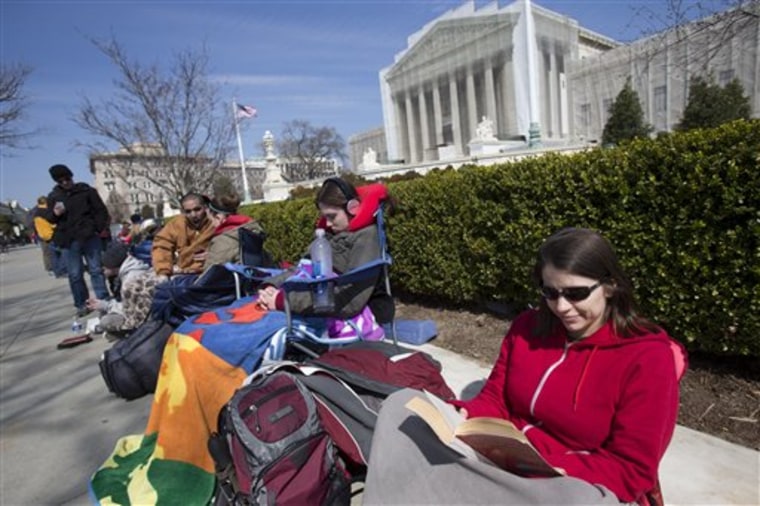With just hours to go before the Supreme Court begins arguments in two landmark cases on marriage equality, the proponents' side just keeps getting bigger. Advocates for same-sex marriage are coming forward in red and purple states, on the heels of a new poll showing a majority of Americans support marriage equality.
Tuesday, the justices will hear a constitutional challenge to California’s Proposition 8, which banned gay marriage. A day later, they’ll consider the Defense of Marriage Act (DOMA), a U.S. law that defines marriage as between a man and a woman, preventing married gay couples from receiving federal benefits.
Despite the chilly temperatures, a line began forming outside the Supreme Court in Washington as early as Saturday, as people sought access to the oral arguments—a sign of just how much is at stake in the twin cases, which come at a time when gay rights advocates appear to have the wind at their backs. A recent poll showed support for gay marriage at a record 58%, and even some prominent conservative and moderate lawmakers are signing on. If the court strikes down both measures and confidently affirms the right of gay Americans to be treated equally, it could add to that momentum. By the same token, adverse rulings would be a setback for the cause. The court’s rulings will be announced in June.
Proposition 8:After California's highest court affirmed gay couples' right to get married in 2008, many did so. But later that year, voters passed Proposition 8, retroactively invalidating their unions. As a result, some of those couples have been suing to overturn the measure.
There are several potential outcomes. Gay marriage supporters want the court to recognize a constitutional right to marry. David Boies, the Washington lawyer who’ll argue the case against Prop 8, called it a “civil right,” on Meet the Press Sunday. If the justices agree, they’d be striking down not just California’s ban but those of other states, too. That would represent a major win for marriage equality advocates.
Next best, from their point of view, would be for the court to say that under the Constitution states can’t give couples all the rights of marriage while not calling it marriage—in other words, civil unions. That “half-a-loaf” ruling would likely mean that gay marriage becomes legal in California and the other eight states that currently allow civil unions but not marriage.
A narrow ruling that applies to California alone is also a possibility. For that to happen, the justices would simply affirm a federal appeals court finding that because the California Supreme Court ruled in favor of gay marriage rights before Prop 8 was passed, the state cannot retroactively take those rights away.
The court could uphold Prop 8. That would not only leave California’s marriage ban in place, it would also signal to other states that under the Constitution, they’re free to ban same-sex marriage as well. Such a ruling could have a silver lining for backers of gay marriage, though, since it likely would give new energy to the political push to legalize marriage in states across the country.
Gay marriage advocates are sounding bullish. “I think we’re going to win,” Boies said on Meet the Press. “I don’t think we’re going to win 5-4. I think this is a basic civil rights issue.”
And court watchers note that the swing vote in the case, Justice Anthony Kennedy, wrote the opinions in the two previous cases that have done the most to expand gay rights: the court’s 2003 ruling striking down Texas’ anti-sodomy law, and a 1996 decision that scrapped a Colorado measure denying anti-discrimination protections to gays and lesbians.
But Kennedy is also a big fan of federalism. (“The Framers split the atom of sovereignty,” he once wrote. “It was the genius of their idea that our citizens would have two political capacities, one state and one federal, each protected from incursion by the other.") Some observers believe that could lead him to look skeptically at the Prop 8 plaintiffs’ key claim—that there’s a fundamental right to marry that should supercede a state’s ability to ban gay marriage.
And in a recent speech, Kennedy didn’t sound eager to go out on a limb with a sweeping pro-gay marriage ruling that might be seen by some as legislating from the bench. “A democracy should not be dependent for its major decisions on what nine unelected people from a narrow legal background have to say,” he said.
The Defense of Marriage ActThe plaintiff in the case, 83-year-old Edith Windsor of New York, was forced to pay $363,000 in inheritance taxes when her wife died, because under DOMA she was barred from receiving the break on federal estate taxes that straight spouses get.
Most observers expect DOMA to be struck down, likely on the basis that it violates the Constitution’s guarantee of equal protection, by treating married gay couples differently from married straight ones. If that happens, married gay couples—as well as widowed spouses including Windsor—would get the benefits of more than 1,000 federal laws relating to marital status.
If, in a surprise ruling, the justices uphold DOMA, states would still be free to allow same-sex marriage. But the country’s highest court would essentially be saying that unlike women, racial minorities, and other groups, gay couples aren’t entitled to equal treatment under the law. That would be a symbolic but striking message to send.
In 2011, the Obama administration said it will not defend DOMA’s constitutionality, meaning the law is being defended by the House Republicans.
Related link: Justice Roberts' lesbian cousin to attend Prop 8 and DOMA hearings
